Turmeric, the golden spice that has been used for centuries in traditional medicine and culinary practices, is gaining increasing attention for its remarkable health benefits. This versatile herb, known for its vibrant hue and unique flavor, is much more than just a seasoning. Packed with a powerful compound called curcumin, turmeric has the potential to improve various aspects of our well-being, from reducing inflammation to enhancing brain function.
The Benefits of Turmeric and Turmeric Health Benefits are numerous and well-documented, making it a true superfood that deserves a prominent place in our daily lives. In this article, we’ll dive deeper into the science behind turmeric’s potent properties and explore how this ancient remedy can positively impact our overall health and wellness.
Key Takeaways
- Turmeric is a golden spice with a long history of medicinal use in traditional practices.
- The active compound in turmeric, curcumin, is responsible for its remarkable health benefits.
- Turmeric has powerful anti-inflammatory properties that can help reduce pain and swelling.
- Curcumin in turmeric may support brain health and cognitive function.
- Incorporating turmeric into your diet can provide a natural boost to your overall well-being.
What is Turmeric?
Turmeric, known scientifically as Curcuma longa, is a vibrant yellow spice that has been used for centuries in various culinary and medicinal applications. This remarkable plant is native to Southeast Asia, primarily cultivated in countries like India, China, and Indonesia. Turmeric’s distinctive hue and flavorful profile have made it a staple ingredient in many traditional cuisines around the world.
Introduction to Turmeric’s Origins
Turmeric is a rhizome, or underground stem, that belongs to the ginger family. It has been used in Ayurvedic and traditional Chinese medicine for thousands of years, prized for its potential health benefits and versatile applications. The plant is believed to have originated in the lush, tropical regions of South Asia, where it has been an integral part of the local culture and cuisine.
Culinary Uses of Turmeric
In the kitchen, turmeric is celebrated for its ability to impart a vibrant golden-yellow hue and earthy, slightly peppery flavor to a wide range of dishes. It is a key ingredient in many curries, rice dishes, and marinades, particularly in Indian, Thai, and Middle Eastern cuisines. Turmeric is also used to color and flavor mustards, cheeses, and even some beverages, making it a versatile and indispensable spice in the culinary world.
Beyond its culinary applications, turmeric has also been used in traditional medicine practices for its potential health benefits, which have sparked increasing scientific interest in recent years. The active compound in turmeric, known as curcumin, has been the subject of numerous studies exploring its anti-inflammatory, antioxidant, and other therapeutic properties.
The Active Compound: Curcumin
At the heart of turmeric’s remarkable health benefits lies an active compound called curcumin. This potent molecule is responsible for the vast majority of turmeric’s therapeutic effects, making it a subject of intense scientific interest and research.
Understanding Curcumin’s Role
Curcumin is a polyphenol compound found in the rhizome of the turmeric plant. It is known for its powerful anti-inflammatory, antioxidant, and neuroprotective properties. Curcumin’s ability to modulate various cellular pathways and signaling molecules is what makes it so valuable in the realm of Turmeric Health Benefits.
How Curcumin Works in the Body
Curcumin’s mechanism of action is multi-faceted. It has been shown to:
- Inhibit the activity of pro-inflammatory enzymes, such as cyclooxygenase-2 (COX-2) and 5-lipoxygenase (5-LOX).
- Reduce the production of inflammatory cytokines, such as tumor necrosis factor-alpha (TNF-α) and interleukin-6 (IL-6).
- Activate antioxidant pathways, such as the Nrf2 signaling pathway, to neutralize free radicals and protect cells from oxidative stress.
- Modulate the activity of various transcription factors, including NF-κB, STAT3, and AP-1, which play crucial roles in regulating inflammation, cell growth, and apoptosis.
Through these diverse mechanisms, Turmeric Curcumin has demonstrated the potential to support a wide range of health benefits, from reducing inflammation and pain to promoting cognitive function and protecting against chronic diseases.
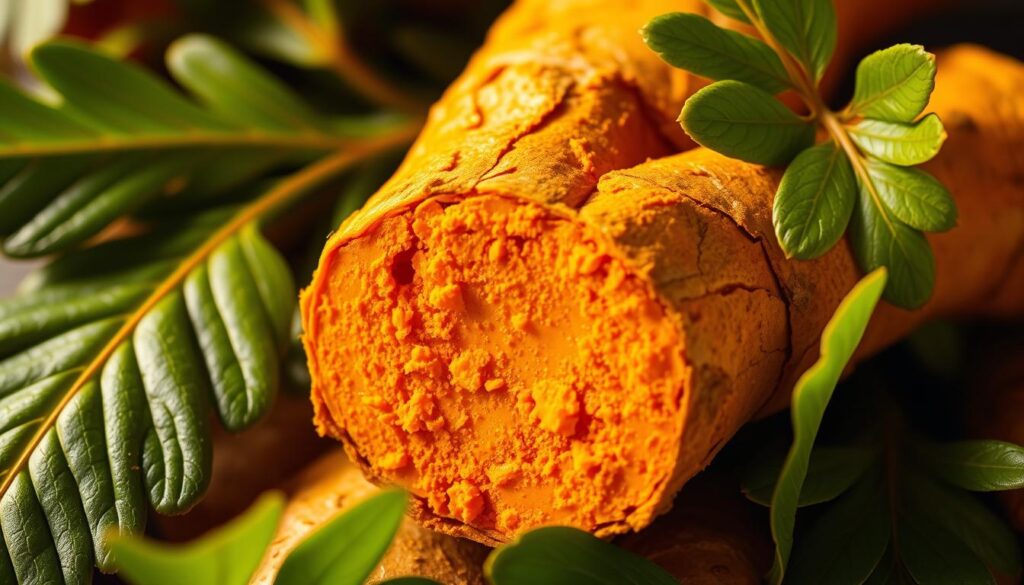
“Curcumin’s multi-targeted approach makes it a promising natural compound for addressing a variety of health concerns.”
Turmeric and Inflammation
Turmeric, a vibrant spice renowned for its distinct flavor and rich hue, is not only a culinary delight but also a powerful natural remedy with remarkable anti-inflammatory properties. The secret to turmeric’s anti-inflammatory prowess lies in its active compound, curcumin, which has been extensively studied for its ability to combat chronic inflammation.
How Turmeric Reduces Inflammation
Curcumin, the primary bioactive compound in turmeric, has been shown to modulate the body’s inflammatory response by targeting key molecular pathways. It can inhibit the activity of pro-inflammatory enzymes, such as cyclooxygenase-2 (COX-2) and lipoxygenase, which are responsible for the production of inflammatory mediators. Additionally, curcumin has the ability to suppress the expression of inflammatory genes, further reducing the overall inflammatory burden within the body.
Scientific Studies Supporting Inflammation Reduction
Numerous scientific studies have explored the Turmeric Anti-inflammatory Properties and confirmed its efficacy in reducing inflammation. One study published in the Journal of Medicinal Food found that curcumin was as effective as ibuprofen in reducing inflammation in patients with knee osteoarthritis, without the adverse side effects typically associated with anti-inflammatory drugs.
Another study, published in the Oncogene journal, demonstrated that curcumin was able to suppress the activation of the nuclear factor-kappa B (NF-κB) pathway, a key regulator of inflammatory responses, in various cancer cell lines. This finding suggests that the Benefits of Turmeric may extend beyond just reducing inflammation, potentially contributing to its potential role in cancer prevention.
“Turmeric has been used for centuries in traditional medicine to treat a wide range of inflammatory conditions, and modern research has confirmed its potent anti-inflammatory effects.”
With its remarkable ability to modulate the inflammatory response, turmeric has emerged as a natural and promising alternative for individuals seeking to manage chronic inflammation and its associated health risks. As the scientific evidence continues to mount, the potential of this humble spice to promote overall well-being is becoming increasingly clear.
Turmeric for Joint Health
Turmeric has long been praised for its anti-inflammatory properties, making it a natural choice for those seeking relief from joint-related issues, particularly arthritis. By harnessing the power of curcumin, the active compound in turmeric, individuals suffering from joint pain and inflammation can find an alternative to traditional medications.
Benefits for Arthritis and Joint Pain
Numerous studies have demonstrated turmeric’s effectiveness in managing the symptoms of arthritis. Curcumin has been shown to inhibit the production of inflammatory enzymes and cytokines, which contribute to joint swelling and discomfort. Additionally, turmeric’s antioxidant properties help reduce oxidative stress on the joints, potentially slowing the progression of arthritis.
Incorporating turmeric into one’s diet or taking curcumin supplements has been linked to improved mobility, reduced joint stiffness, and a decrease in the need for pain medication among those with osteoarthritis and rheumatoid arthritis.
Turmeric vs. Traditional Anti-Inflammatories
| Feature | Turmeric | Traditional Anti-Inflammatories |
|---|---|---|
| Mechanism of Action | Inhibits inflammatory enzymes and cytokines | Blocks prostaglandin production |
| Side Effects | Generally well-tolerated, minimal side effects | Increased risk of gastrointestinal issues, cardiovascular problems |
| Long-term Use | Can be safely used for extended periods | Increased risk of adverse effects with prolonged use |
| Cost | Relatively affordable, available as a dietary supplement | Prescription medications can be more expensive |
While traditional non-steroidal anti-inflammatory drugs (NSAIDs) can provide relief for joint pain, they come with a risk of adverse side effects, particularly with long-term use. Turmeric, on the other hand, offers a natural alternative that is generally well-tolerated and can be safely incorporated into one’s daily routine.
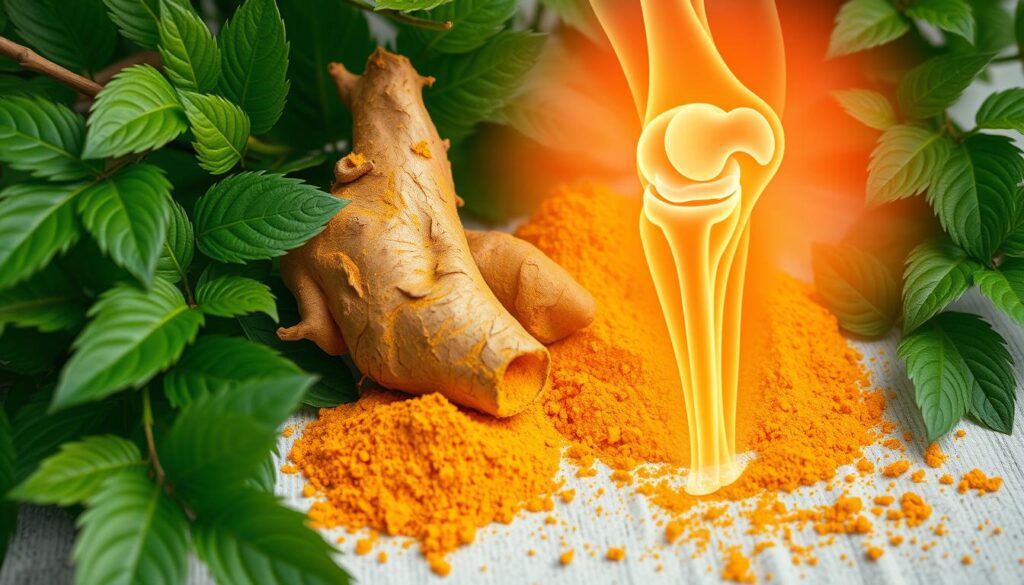
Turmeric as an Antioxidant
Turmeric is renowned for its impressive antioxidant properties, which play a vital role in supporting overall Turmeric Health Benefits. Antioxidants are substances that help neutralize harmful free radicals in the body, reducing oxidative stress and preventing cellular damage. This makes them crucial for maintaining good health and preventing the development of various diseases.
The Importance of Antioxidants
Free radicals are unstable molecules that can cause widespread damage to cells, proteins, and DNA if left unchecked. Antioxidants like those found in turmeric work by scavenging these free radicals, preventing them from wreaking havoc on the body. By neutralizing free radicals, antioxidants help reduce inflammation, support the immune system, and promote healthy aging.
Turmeric’s Antioxidant Properties in the Body
Turmeric Antioxidants are primarily derived from the active compound curcumin, which is responsible for turmeric’s vibrant yellow color. Curcumin is a powerful antioxidant that has been shown to be more effective than vitamins C and E in neutralizing free radicals. Studies have found that turmeric’s antioxidant effects can help protect the body from oxidative stress, reduce inflammation, and even support cognitive function.
“Turmeric is a veritable powerhouse of antioxidants, offering a natural and effective way to combat the harmful effects of free radicals in the body.”
By incorporating Turmeric Antioxidants into your diet, you can harness the incredible health benefits of this remarkable spice and support your overall well-being.
Supporting Heart Health with Turmeric
Turmeric, with its active compound curcumin, has been the subject of extensive research for its potential benefits in supporting heart health. From improving endothelial function to reducing inflammation and influencing cholesterol levels, the benefits of turmeric have captivated the attention of health enthusiasts and medical professionals alike.
Preventing Heart Disease
Studies have suggested that curcumin, the key active ingredient in turmeric, may play a crucial role in preventing the development of heart disease. Curcumin has been found to improve the function of the endothelium, the thin layer of cells lining the inside of blood vessels. By enhancing endothelial function, curcumin may help maintain healthy blood flow and reduce the risk of cardiovascular complications.
Turmeric’s Effect on Cholesterol Levels
In addition to its endothelial benefits, curcumin has also been shown to have a positive impact on cholesterol levels. Numerous studies have demonstrated that turmeric supplementation can help lower LDL (bad) cholesterol and increase HDL (good) cholesterol, thereby contributing to overall heart health. This Turmeric Health Benefits may be particularly beneficial for individuals struggling with high cholesterol or at risk of developing cardiovascular disease.
| Cholesterol Marker | Turmeric’s Effect |
|---|---|
| LDL (Bad Cholesterol) | Decrease |
| HDL (Good Cholesterol) | Increase |
By addressing both endothelial function and cholesterol levels, turmeric’s active compounds may play a multifaceted role in supporting cardiovascular health and reducing the risk of heart disease. As with any dietary supplement, it’s essential to consult with a healthcare professional before incorporating turmeric into your routine, especially if you have any existing medical conditions or are taking medications.
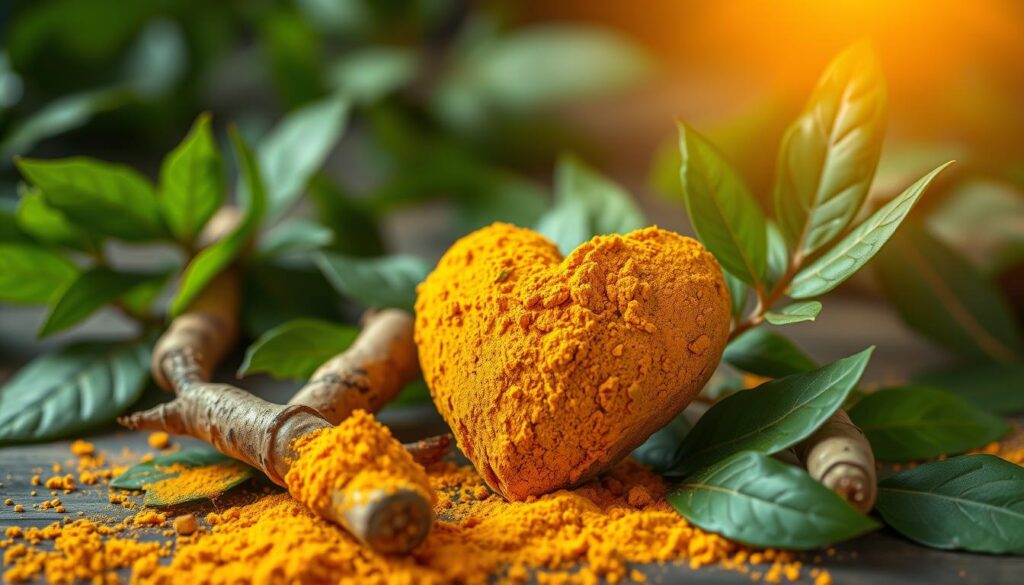
Turmeric and Digestive Health
The remarkable Turmeric Health Benefits extend far beyond its culinary uses. This vibrant spice has long been recognized for its positive effects on digestive health. At the heart of turmeric’s digestive superpowers lies its active compound, curcumin, which has been extensively studied for its therapeutic properties.
Positive Effects on Digestion
Curcumin, the primary active compound in turmeric, has been shown to possess anti-inflammatory and antioxidant properties that can provide relief for various digestive issues. Studies suggest that turmeric may help alleviate symptoms of Inflammatory Bowel Disease (IBD), including ulcerative colitis and Crohn’s disease, by reducing inflammation in the gut.
Additionally, turmeric has been found to be effective in managing acid reflux and heartburn. Curcumin’s ability to regulate stomach acid production and soothe the esophageal lining can provide welcome relief for those struggling with these common digestive discomforts.
Turmeric for Gut Health
The Benefits of Turmeric extend beyond just alleviating digestive symptoms; it may also play a role in supporting overall gut health. Curcumin has been observed to positively influence the gut microbiome, promoting the growth of beneficial bacteria while inhibiting the proliferation of harmful ones.
This delicate balance within the gut can have far-reaching implications for overall well-being, as a healthy gut microbiome is closely linked to a strong immune system, proper nutrient absorption, and even mental health.
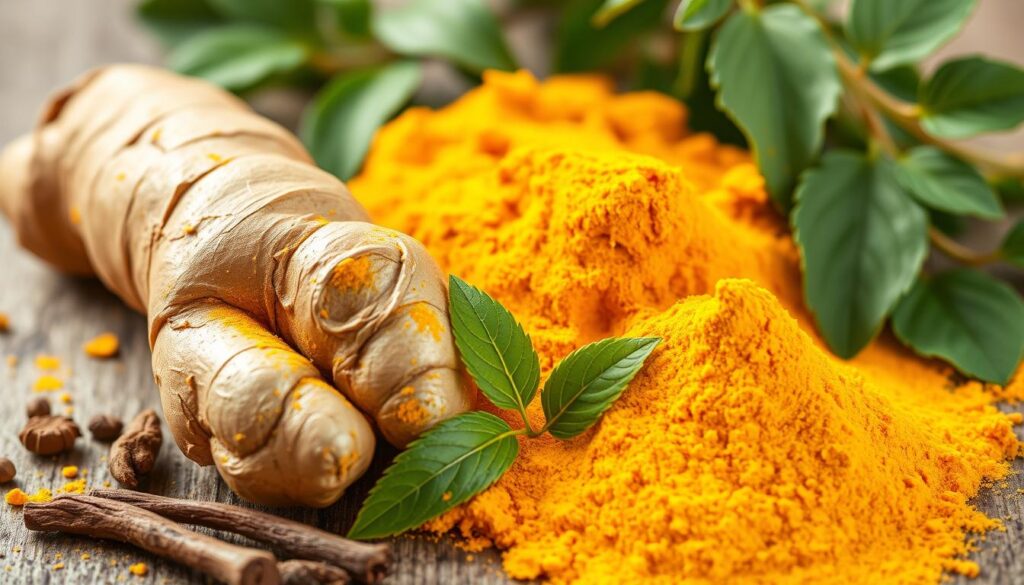
Whether you’re seeking relief from digestive woes or simply want to support your overall gut health, incorporating turmeric into your diet may be a natural and effective solution worth exploring.
Turmeric’s Role in Cancer Prevention
Turmeric, a vibrant yellow spice widely used in culinary and traditional medicinal practices, has garnered increasing attention for its potential anti-cancer properties. The active compound in turmeric, known as curcumin, has been the subject of extensive research, revealing its remarkable ability to inhibit the growth and spread of various cancer cells.
How Turmeric May Help Prevent Cancer
Numerous studies have showcased the extraordinary abilities of Turmeric Curcumin in combating cancer. Curcumin has been found to possess potent antioxidant and anti-inflammatory properties, which play a crucial role in preventing the initiation and progression of cancer. This versatile compound has the ability to target multiple pathways involved in the development of cancer, including cell signaling, tumor angiogenesis, and metastasis.
Research on Curcumin and Cancer Cells
- In-vitro studies have demonstrated the ability of curcumin to induce apoptosis (programmed cell death) in various cancer cell lines, including breast, prostate, and colorectal cancers.
- Animal studies have shown that curcumin can inhibit the growth of tumors and suppress the spread of cancer cells to other organs.
- Promising clinical trials have suggested that curcumin may serve as a complementary therapy in cancer treatment, enhancing the efficacy of conventional therapies while mitigating their side effects.
The wealth of research on the Turmeric Health Benefits of curcumin has sparked growing interest in the potential of this natural compound to play a pivotal role in cancer prevention and management. As the scientific community continues to explore the mechanisms by which Turmeric Curcumin exerts its anti-cancer effects, the future holds promise for the integration of this powerful spice into comprehensive cancer-fighting strategies.
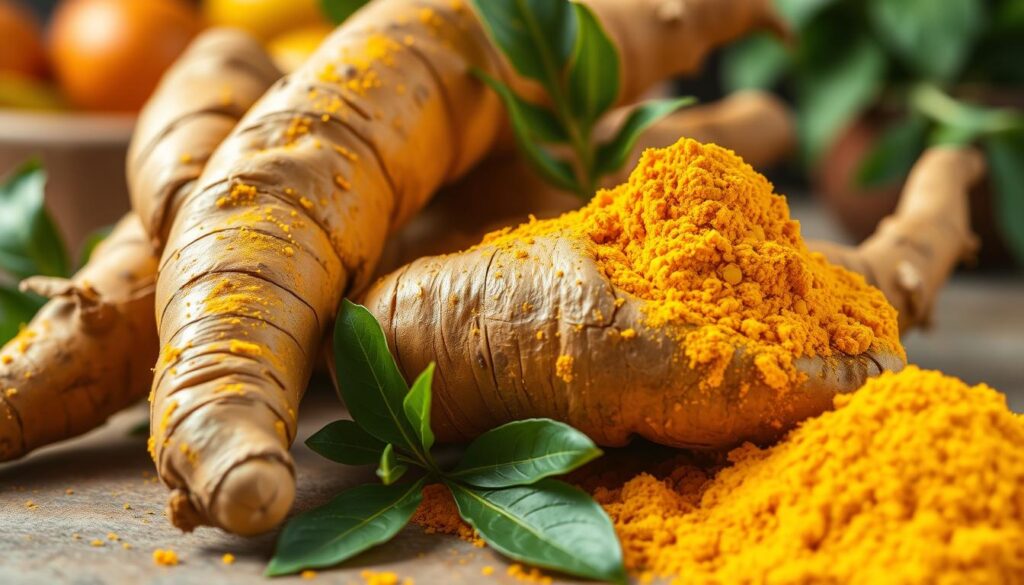
“Turmeric has been used for centuries in traditional medicine, and the growing body of scientific evidence supports its potential as a natural cancer preventive agent.”
Enhancing Brain Function Through Turmeric
In the vast array of benefits of turmeric, its potential to support cognitive health and brain function stands out as a true gem. The active compound in turmeric, curcumin, has been the subject of extensive research, revealing its remarkable ability to not only protect the brain, but also enhance its performance.
The Connection Between Turmeric and Brain Health
Curcumin, the powerful antioxidant found in turmeric, has been shown to have a profound impact on the brain. It can cross the blood-brain barrier, allowing it to directly interact with and influence various brain processes. Curcumin’s anti-inflammatory properties play a crucial role in reducing neuroinflammation, which is a contributing factor to many neurodegenerative conditions.
Preventing Neurodegenerative Diseases
One of the most exciting turmeric health benefits is its potential to prevent and even slow the progression of neurodegenerative diseases, such as Alzheimer’s and Parkinson’s. Curcumin has been shown to exhibit neuroprotective effects, shielding brain cells from damage and promoting the growth of new neural connections. By targeting the underlying mechanisms of these debilitating conditions, turmeric may offer a natural and effective way to safeguard cognitive function.
Moreover, curcumin’s ability to enhance memory and cognitive function has been the focus of numerous studies. Researchers have discovered that turmeric can improve spatial and working memory, as well as attention and processing speed, making it a promising natural solution for maintaining a healthy, sharp, and agile mind.
“Turmeric’s potential to support brain health and prevent neurodegenerative diseases is truly remarkable. The research on curcumin’s neuroprotective properties is both exciting and promising.”
As the scientific community continues to unravel the mysteries of the brain, the role of turmeric in enhancing cognitive function and staving off neurological decline is becoming increasingly clear. By incorporating this vibrant spice into our diets, we may unlock a path towards a healthier, more resilient, and more adaptive brain.
Turmeric and Mental Health
Turmeric, a vibrant yellow spice derived from the roots of the Curcuma longa plant, has long been celebrated for its remarkable health benefits. In recent years, increasing attention has been paid to the potential impact of turmeric, and its active compound curcumin, on mental health. Mounting evidence suggests that this versatile spice may hold the key to improving mood, alleviating symptoms of depression, and promoting overall mental well-being.
Turmeric’s Impact on Mood and Depression
One of the most intriguing aspects of turmeric’s health benefits is its ability to influence mood and potentially alleviate symptoms of depression. Curcumin, the primary active ingredient in turmeric, has been shown to possess neuroprotective properties, which may help regulate neurotransmitter levels and reduce inflammation in the brain. These factors are closely linked to the development and management of mood disorders.
Studies on Curcumin and Mental Well-being
Several studies have explored the relationship between curcumin and mental well-being. One randomized controlled trial found that curcumin supplementation resulted in a significant reduction in depressive symptoms compared to a placebo. Additionally, a systematic review of multiple studies concluded that curcumin may be an effective and safe alternative therapy for the treatment of major depressive disorder.
“Turmeric’s potential to positively impact mental health is an exciting area of research, with promising results emerging from scientific studies.”
The growing body of research on turmeric and mental health suggests that this ancient spice may hold the key to unlocking improved mood, reduced anxiety, and better overall mental well-being. As the scientific community continues to explore the full extent of turmeric’s benefits, the future looks bright for those seeking natural and effective solutions to support their mental health.
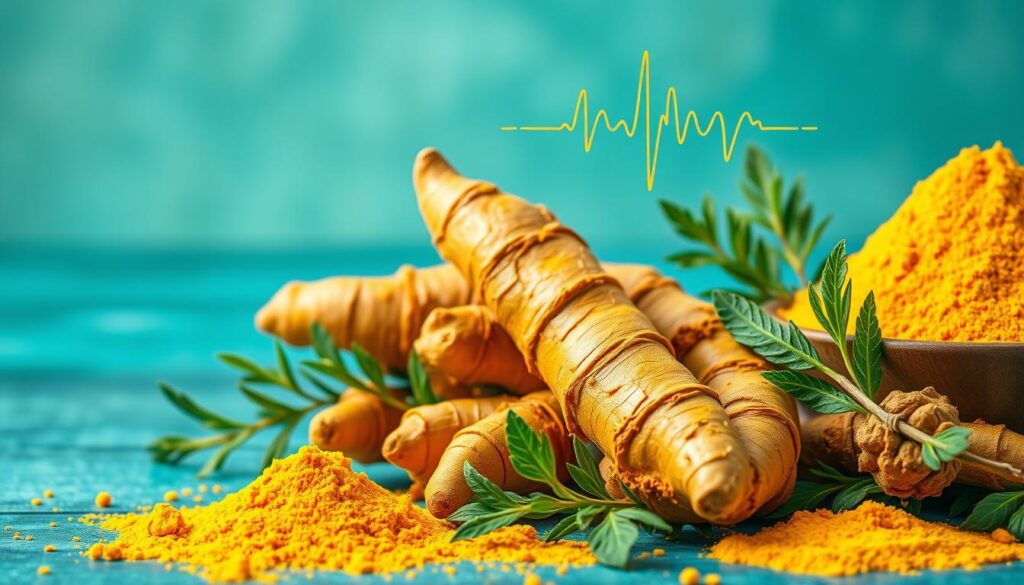
Incorporating Turmeric into Your Diet
Turmeric, with its vibrant golden hue and distinctive earthy flavor, is a versatile spice that can easily be incorporated into a variety of dishes. Whether you’re a seasoned home chef or just starting to explore the culinary world, there are numerous ways to enjoy the amazing health benefits of Turmeric Recipes.
Delicious Recipes Featuring Turmeric
From fragrant curries and flavorful rice dishes to creamy smoothies and golden lattes, turmeric can elevate the taste and nutritional value of your meals. Consider trying these mouthwatering turmeric-based recipes:
- Turmeric Roasted Vegetables: Toss cubed potatoes, carrots, and onions with turmeric, olive oil, and your favorite spices for a vibrant and nourishing side dish.
- Turmeric Chicken Curry: Sauté chicken in a fragrant blend of turmeric, ginger, garlic, and aromatic spices for a comforting and flavorful main course.
- Turmeric Latte: Whisk together warm milk, turmeric, honey, and a pinch of black pepper for a soothing and anti-inflammatory beverage.
Tips for Using Turmeric Effectively
To maximize the absorption and benefits of turmeric, consider the following tips:
- Pair turmeric with black pepper, as the piperine in black pepper helps enhance the bioavailability of curcumin, the active compound in turmeric.
- Use healthy fats, such as coconut oil or olive oil, when cooking with turmeric to further improve its absorption.
- For those who prefer Turmeric Supplements, look for high-quality supplements that contain the full spectrum of turmeric’s beneficial compounds.
By incorporating turmeric into your diet through a variety of delicious recipes and supplements, you can enjoy the numerous health benefits this versatile spice has to offer.
Potential Side Effects and Precautions
While turmeric is generally considered safe for most individuals, it’s essential to be aware of potential side effects and precautions when consuming it, particularly in supplement form. Turmeric, with its active compound Turmeric Supplements, is a powerful spice, and like any substance, it’s crucial to use it responsibly and within recommended guidelines.
When to Avoid Turmeric
Individuals with certain medical conditions should exercise caution or avoid turmeric consumption altogether. Those with gallbladder issues, blood clotting disorders, or diabetes may need to consult their healthcare provider before incorporating Turmeric Health Benefits into their regimen. Pregnant or breastfeeding women should also speak with their doctor before using turmeric supplements, as the safety data in these cases is limited.
Interactions with Medications
Turmeric can potentially interact with various medications, including blood thinners, diabetes medications, and certain chemotherapy drugs. Individuals taking prescription medications should discuss the use of turmeric supplements with their healthcare provider to ensure there are no adverse interactions or contraindications. Proper dosage and timing are essential to minimize any risks associated with combining turmeric with other substances.